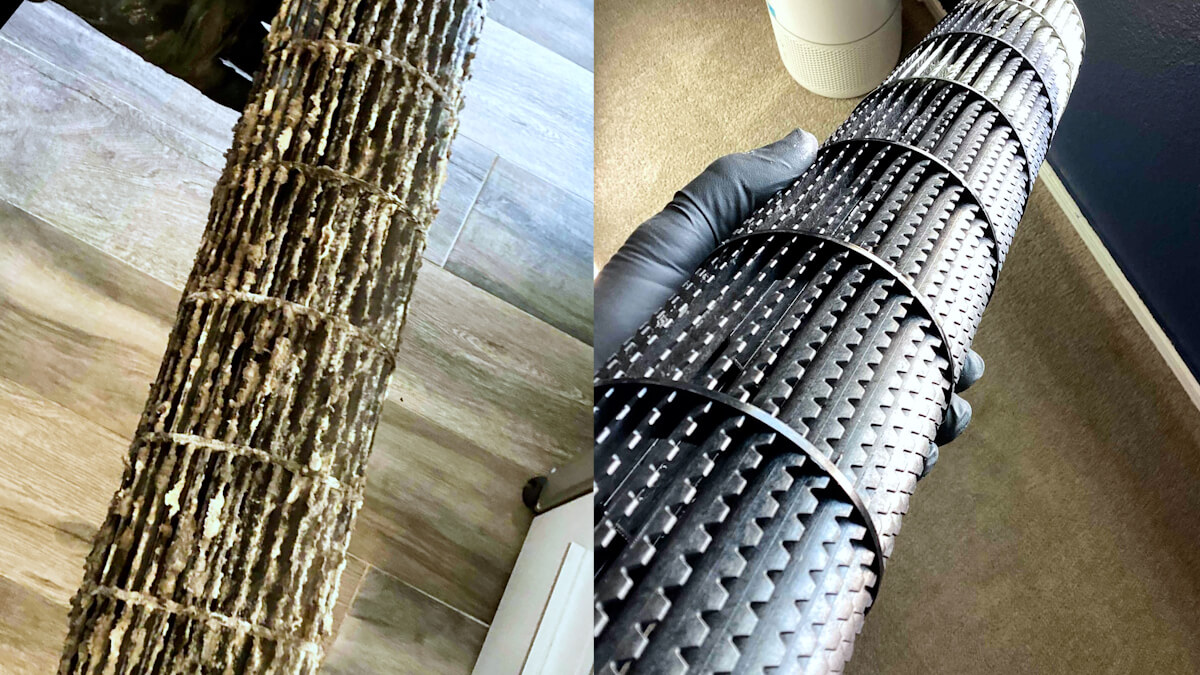Mini split systems are one of the best ways to keep your home comfortable throughout the year. They operate quietly, use energy efficiently, and let you fine-tune your indoor temperature. But when your mini split starts to smell bad, that comfort fades fast. A strange odor is not only unpleasant, it’s often a sign that something inside your system needs attention.
Different smells usually point to specific problems. Some are simple maintenance issues, while others could be warning signs of something more serious. Understanding what each smell means helps you decide when you can fix it yourself and when to call in a professional.

Common Mini Split Odors and What They Mean
Musty or Moldy Smell
A musty odor is one of the most common smells homeowners notice. It usually means mold or mildew is growing inside the air handler or drain pan. These smells often start out faint but can become stronger with time, especially in humid climates like Central Texas or if your unit runs frequently.
This happens when:
- Condensation inside the unit doesn’t drain properly
- Dust and dirt combine with moisture to create mold
- The unit hasn’t been cleaned or filters haven’t been replaced in a while
Mold thrives in dark, damp areas, making your indoor unit a perfect home for it. Besides being unpleasant, mold can affect air quality and trigger allergy or asthma symptoms. If your system smells musty, it likely needs a deep cleaning and a drain line flush. Once the buildup is removed, airflow improves and the smell goes away.
Sour or Vinegar-Like Smell
A sour or acidic odor usually comes from bacteria forming on the evaporator coil or in the condensate line. Mini splits naturally collect moisture during operation, and that damp environment is ideal for bacterial growth. The smell often spreads throughout the house when the system cycles on.
If your mini split sat unused for a season, bacteria may have built up unnoticed. When the unit starts again, the odor becomes noticeable. A professional cleaning, especially of the coils and drain line, can eliminate the smell and help prevent it from returning. Scheduling regular maintenance can keep bacteria from forming in the first place.
Rotten Egg or Sulfur Smell
A rotten egg or sulfur odor can mean an animal has made its way into your mini split or wall cavity and died. Small rodents or insects sometimes get inside outdoor condensers or wall openings. However, if the smell lingers even when the unit is turned off, it may be something more serious, such as a gas issue.
If you suspect a gas leak:
- Turn off the system immediately
- Leave your home
- Call your gas provider or emergency services before contacting your HVAC company
Never attempt to troubleshoot a possible gas leak yourself. Once the area is safe, a technician can inspect the system to remove any debris and confirm that no leaks are present.
Burning or Electrical Smell
A light burning smell when first turning on your mini split for the season can be normal. Dust burning off the heating components should fade quickly. If the odor is sharp, smoky, or persistent, however, it may point to an electrical or mechanical problem.
Common causes include:
- Overheating wires or electrical components
- A failing motor or fan belt
- A malfunctioning compressor or short circuit
These issues can cause further damage or pose a safety risk. Turn the system off right away and have it inspected. An HVAC technician can identify the source and make the needed repairs before things worsen.
Chemical or Sweet Smell
A sweet or chemical smell often signals a refrigerant leak. Refrigerant has a distinct odor and is hazardous if inhaled. In addition to the smell, you may notice:
- Weak or inconsistent airflow
- Ice on the indoor coil or refrigerant lines
- Longer run times or poor cooling performance
Refrigerant leaks should always be handled by a licensed HVAC professional. The system must be sealed, recharged, and tested to ensure safe operation. Ignoring a leak can reduce efficiency and cause long-term system damage.
Why These Smells Develop
Mini splits manage both airflow and moisture, which makes them vulnerable to odor-causing buildup when neglected. Over time, dust, moisture, and organic debris collect inside the unit and drain system. Without cleaning, that buildup encourages the growth of bacteria and mold or can even lead to electrical overheating.
Common causes include:
- Moisture trapped in the air handler
- Clogged or dirty air filters
- Blocked condensate drain lines
- Mold or bacterial buildup on coils
- Overheated mechanical or electrical parts
In Austin’s humid climate, these problems develop faster than in drier regions. Seasonal tune-ups help prevent moisture buildup and keep your mini split performing efficiently year after year.
What You Can Do as a Homeowner
Some maintenance tasks are simple enough to handle yourself and can go a long way toward preventing smells:
- Clean or replace air filters monthly. Dirty filters trap debris that causes odors and restrict airflow.
- Check for water leaks or pooling near the indoor unit. This may point to a blocked drain line.
- Wipe down the exterior panels to keep dust from getting inside.
- Avoid air fresheners or sprays near your mini split. They mask the smell but don’t fix the cause.
- Keep the area around the unit open so it can breathe and operate efficiently.
If you’ve tried these steps and the smell continues, it’s best to schedule professional cleaning. Persistent odors mean the problem is deeper inside the system.
How Koala Cooling Can Help
At Koala Cooling & Plumbing, we specialize in diagnosing and cleaning mini split systems across the Austin & Round Rock area. Our trained technicians don’t just cover up odors; they eliminate them at the source.
Our detailed cleaning service includes:
- Disinfecting coils and internal components
- Flushing condensate drain lines
- Inspecting for refrigerant or electrical problems
- Checking airflow and overall system performance
- Applying antimicrobial treatments where needed
Regular professional maintenance prevents odors, reduces energy costs, and extends your system’s life. Many homeowners notice fresher air and better comfort after just one visit.
For hassle-free upkeep, join our Koala Club. Members enjoy routine tune-ups, priority scheduling, and exclusive savings. It’s designed to keep your mini split clean, efficient, and odor-free throughout the year.
Keep Your Home Fresh and Comfortable
A smelly mini split is more than a nuisance. It’s a warning sign that something needs attention. Whether it’s mold, bacteria, or an electrical issue, fixing it early keeps your home safe and comfortable while preventing costly repairs down the road.
If you are in the Austin area and your mini split has started to smell, contact us today. Our team will inspect, clean, and restore your system so you can breathe easy again.
